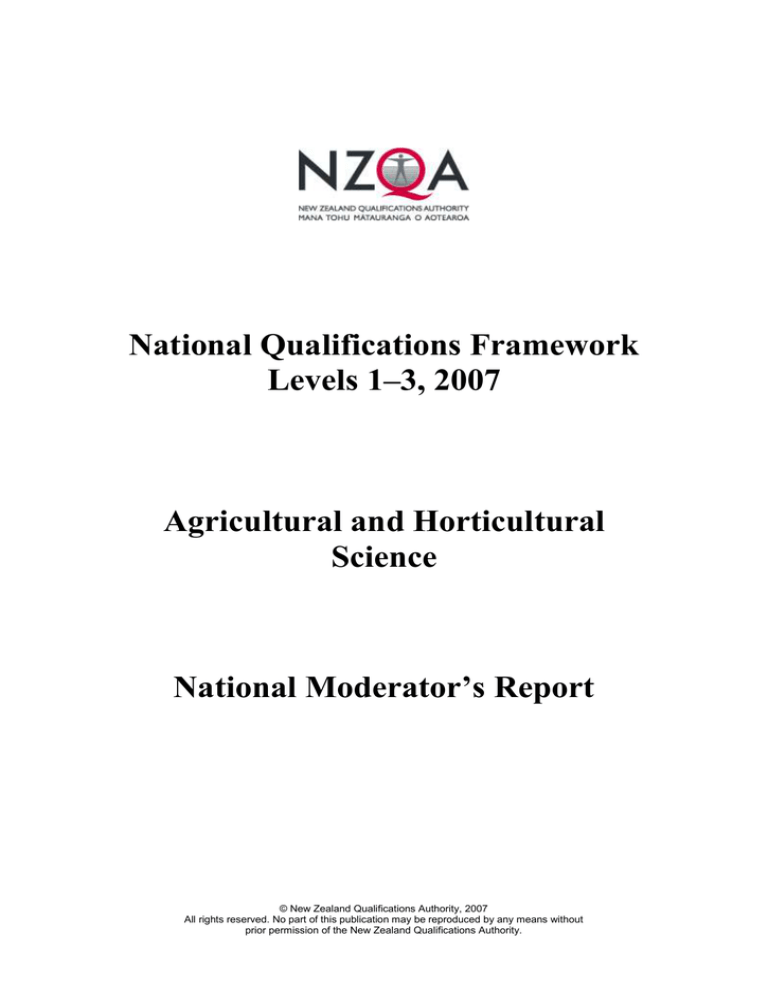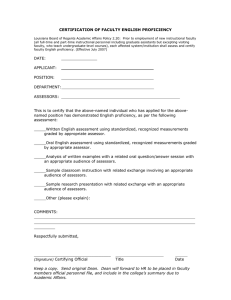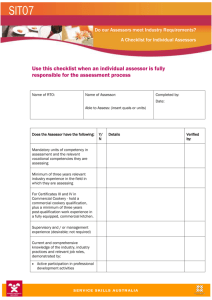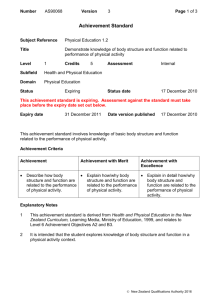
National Qualifications Framework
Levels 1–3, 2007
Agricultural and Horticultural
Science
National Moderator’s Report
© New Zealand Qualifications Authority, 2007
All rights reserved. No part of this publication may be reproduced by any means without
prior permission of the New Zealand Qualifications Authority.
National Qualifications Framework Levels 1–3 (Agricultural and Horticultural Science) 2007 - page 2
National Moderator’s Report
General Guidance for Assessors of Achievement and Unit Standards
The purpose of external moderation is to provide reassurance that assessor
judgments are at the national standard and are made on the basis of assessment
materials that are fair and valid.
All assessment materials are expected to:
•
give the learner the opportunity to meet the requirements of the standard
•
have an assessment schedule that gives evidence of appropriate learner responses
and clear judgments at all levels.
The Ministry of Education contracted subject experts to write assessment resources for
achievement standards. These are not pre-moderated. The intention is that they are
modified to suit teaching programmes and learner needs. They do not provide “rules”
but suggest different ways of assessing to the nationally registered standard.
General Overall Comment
Moderation in 2007 highlighted the need to repeat many comments made in the 2006
National Moderator’s Report.
Assessors should be aware of the latest registered versions of the achievement standards
and the Ministry of Education (MOE) exemplar material developed for each internal
achievement standard. Exemplar materials on the MOE site that did not meet the
national standard have been deleted or modified and assessors are urged to download
the current assessment activities for use in 2008.
Assessors should be aware that they can change the context of the MOE exemplars
without affecting the validity of the task. Where significant changes are made to the
exemplar materials there is a requirement for changes in the assessment schedule to
meet the modified task. It is suggested that changes to exemplars should be minor such
as changing a horticulture focus to an agriculture focus, or vice versa. If the provider
wishes to make widespread changes it is advisable to disregard the exemplar material.
Providers are encouraged to develop their own assessment materials.
Assessors are responsible for ensuring assessment activities, regardless of the
source, meet the requirements of the current registered standard. Activities, whether
purchased, self developed, received from a colleague or downloaded from a website still
need to face the schools’ internal moderation system before being used for assessment
and submitted for moderation.
The version number required on the moderation cover sheet refers to the achievement
standard not the version of the MOE exemplar.
90156: Carry out an agricultural or horticultural investigation with guidance
Group work is permissible during the planning and carrying out of the investigation however
individual work is mandatory when processing data and writing the final report. If group work
is undertaken the assessor must provide evidence that each student has contributed to the plan
National Qualifications Framework Levels 1–3 (Agricultural and Horticultural Science) 2007 - page 3
and collection of data. This could be achieved by a grid of student names containing criteria
relating to level of involvement.
Assessors must give sufficient guidance to students to understand that a valid range for the
independent variable involves at least three.
Processing of data, at a basic level, could be achieved by way of a well constructed table which
clearly shows a pattern or trend (or lack thereof).
A valid range is required for merit, that is, the range is realistic for the given situation.
The main evidence looked for at merit level are the quality of the plan and the quality of data
processing. Accuracy in both aspects is essential. Students who conduct multiple trials but then
proceed to graph the results of all trials, not the averaged data, are not working at merit level.
The determination of excellence is the evaluation of how the actual plan used produces a valid
conclusion. It does not involve what the student should have done; trialling the plan should
have highlighted any deficiencies of the plan.
90157: Demonstrate practical skills in agriculture or horticulture production
Assessors must submit the discriminating criteria (the requirements for achievement, merit and
excellence) used to award the level of achievement in each practical skill. Guidance as to type
of criteria at different levels of achievement is provided in explanatory note 8. They emphasise
quality of performance and not the coverage of a number of different stages.
Practical skills are discrete units of work not components of work (eg calculate the spray mix,
spraying technique, clean up of sprayer) within a skill.
A “range” of practical skills (at least three) are required at each level of achievement. Offering
more than three practical skills is advocated.
Judgements for practical skills require care. Excellence requires three skills at excellence level
of performance; merit requires three skills at merit or excellence level.
Horticulture options should provide a greater range of materials, equipment, products and
conditions to satisfy criteria 1. Naming four weeds, four garden tools and four plant diseases
does not satisfy requirements. The MOE exemplars provide clear guidance.
Some assessors are adapting MOE exemplar materials to suit local needs but in some cases
assessors require students to ‘explain’ or ‘justify’ certain techniques or equipment used. The
standard does not require explanations or justifications at any level of achievement.
90450: Carry out an agricultural or horticultural investigation with supervision
The intent of the standard is that students plan their own investigation that extends over a
period of time. This is different to the level 1 standard where the plan could be carried out in a
single class period.
The expectation is that students will carry out their own plan and that plans, data and reports
will reveal differences in student responses if a common task is set.
National Qualifications Framework Levels 1–3 (Agricultural and Horticultural Science) 2007 - page 4
Often the submitted task clearly and correctly states that the investigation is to be conducted
individually during all stages however, the method, data and processing are often identical in
student reports.
Group work is not permitted when assessing this standard.
Template sheets are not permitted because they provide too much guidance (unlike the focus of
the Level 1 investigation). A checklist as used in the TKI exemplars is allowed.
90455: Describe how livestock behaviour impacts on productivity
Assessors should ensure that the terms “task” and “management practices” are not incorrectly
substituted for each other in this standard.
At achievement and merit level students are required to explain how interactions between
behaviour and management impact on productivity within a production system.
The task can apply to a variety of livestock species at the achievement and merit level however,
the excellence criteria does relate to a production system which on a pig, poultry or dairy unit
will involve a single livestock species.
90649: Research the production and marketing of a locally produced primary
product
The high 6 credit value indicates that student research should be exacting and comprehensive.
At least two factors affecting supply and two factors affecting demand need to be explained at
all levels of achievement and detailed information on significant management practices within
the production process is essential.
The standard has a research focus but evidence from 2007 moderation indicates that many
students were content with downloading and/or submitting extracts from secondary data that
had some relevance to the product selected. Such information was rarely analysed in a manner
that allowed for the integration of ideas essential for merit and excellence. It is expected that
students will provide relevant, accurate data.
Explanations of management practices and market requirements often lacked the level of
understanding and detail required at level 3. Descriptions of what happens do not constitute an
explanation.
A single interview with a producer, on its own, does not constitute “research”. It must be
supported by information derived from other sources.
Explanatory note 4 requires students to acknowledge sources of information in a traceable
reference system. It is suggested that tasks provided to students provide examples of how
books, internet material etc. should be acknowledged.
Students who present relevant and some irrelevant material on both production and marketing
but who cannot establish linkages are achievement students at best.
While it is relatively straight forward for students to access relevant information on the
production process, information on marketability is often more difficult to access. Marketing
is an essential aspect of the standard and requires equal importance.
National Qualifications Framework Levels 1–3 (Agricultural and Horticultural Science) 2007 - page 5
Assessors should modify the exemplar assessment schedule to fit the primary product that
students are researching. There is an expectation that if all students are researching apples then
evidence statements specific to apples is provided. If students are researching different primary
products then it is not possible or practicable to provide evidence for each product. In this case,
there is an expectation that evidence will be of an equivalent standard to that provided in the
schedule.
90650: Investigate production and marketing of a nationally significant primary product
The information-gathering techniques to be used are stipulated in explanatory note 3
and the MOE exemplar has been modified to accommodate the changes made.
Surveys, if used, must contain relevant questions to the aspect of production or
marketing being investigated. Survey responses must be analysed and this information
used to draw conclusions and make recommendations.
Most students use secondary data and field trips as techniques. They must provide the
raw information, at least as an appendix, and show evidence of analysis of the raw
information from which they draw conclusions and make recommendations.
When writing reports it is not permissible to introduce new information that was not
gathered using the identified information-gathering techniques.
Information from all techniques must be used when reporting on the investigation.
The main weakness in student reports is establishing linkages between production and
marketing using the information students had found out.
Assessors should modify the exemplar assessment schedule to fit the primary product
that students are investigating. There is an expectation that if all students are
investigating apples then evidence statements specific to apples and not potatoes is
provided.
Unit Standards
18984: Describe plant parts and their functions
The comments made in the 2006 National Moderator’s Report still apply and should be
referred to for additional clarifications.
Assessors should ensure that questions/tasks related to element 3 Describe the effect of
the physical environment on plant growth are clear in terms of what knowledge they
require students to demonstrate and that questions/tasks related to element 4 Describe
soil as a growing medium are assessing the requirements of the element.



